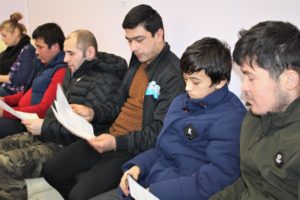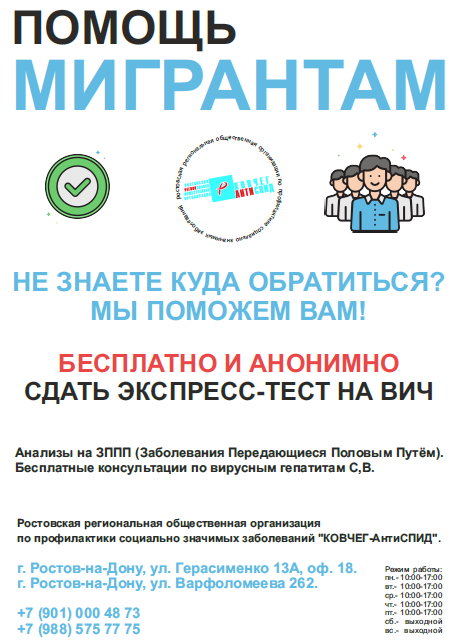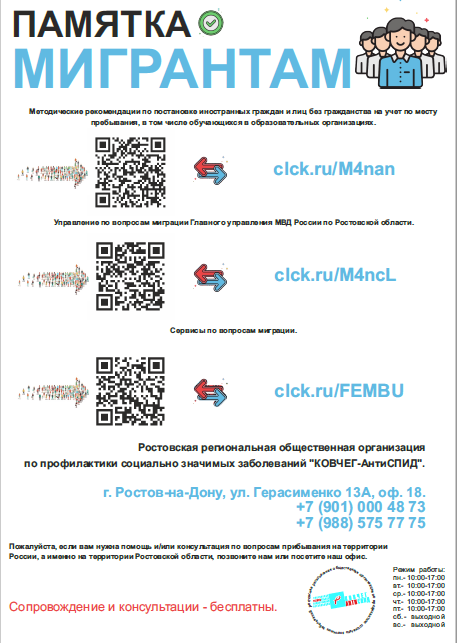According to UNAIDS (www.unaids.org)[1], Russia has the second highest number of labour migrants in the world after the USA. Rostov region is one of the areas where this number is constantly growing. One of the reasons is its geographical position – Rostov region has the biggest borderline with Ukraine. Due to this fact as well as certain developments related to the armed conflict in Donetsk and Lugansk regions, many migrants from Ukraine with different statuses are coming to Rostov region, in addition to the labour migrants from Central Asia.
Are there any special services for migrants in Rostov-on-Don? How is HIV prevention implemented among migrants? Where can migrants seek help without endangering themselves? AFEW International asked these questions to Vyacheslav Tsunik, President of Rostov-on-Don Regional NGO “KOVCHEG – AntiAIDS” and Manager of the Project “HIV Prevention and HIV Services for Migrants in Rostov-on-Don”.
Significant financial support to carry out surveys and provide services to migrants within this project was provided by AFEW International, which, in particular, facilitated coordination with the Central Asian organisations to provide effective support to migrants when they leave their countries of origin and come to Russia.
Labour migrants are one of the populations most vulnerable to HIV in the world, which is explained by a number of factors. The data of numerous studies show that people coming from the Central Asia have a very low knowledge of infectious diseases: HIV/AIDS, hepatitis B and C. The situation is further aggravated with the low social and economic status of the migrants from Central Asia and the neighbouring countries, lack of access to health services, low level of social support and high prevalence of depression caused by such people living away from their families. High isolation of this social group often leads to HIV transmission inside this community, in particular through contacts with female sex workers, who come from the same countries.
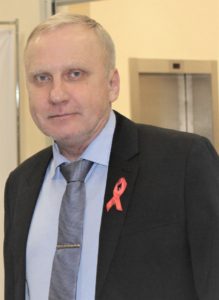 Vyacheslav, how accessible is health care for the labour migrants in Rostov-on-Don?
Vyacheslav, how accessible is health care for the labour migrants in Rostov-on-Don?
Health care is provided to the labour migrants who officially live in Russia, in particular in Rostov region, based on their insurance certificates, which they buy when registering their patents. Without certificates, people can access health care on a paid basis, while emergency care if a person’s life is under threat in cases of heart attacks, strokes, catastrophes or accidents is provided to everyone, even with no documents, free of charge and is covered by the state.
How well informed are labour migrants about the problem of HIV?
Surveys among the labour migrants showed that they are not well informed about HIV. In our opinion, the reason is lack of preventive information provided to them in educational institutions in their home countries and when they come to work in Russia.
Do migrants practice any risky behaviours?
In fact, the prevalence of risky behaviours among migrants is approximately the same as among all young people. If we talk about the migrants who come from Asia, e.g. from Tajikistan and Uzbekistan, they have less risky behaviour due to their national customs and traditions. They mostly socialize with their fellow countrymen and they also have respect to older people and certain traditions, which restrict their risky behaviours. As for people from Ukraine and Moldova, they are closer to us, Russians, in terms of their culture and so the situation among them is similar to ours. There are young people who practice high-risk behaviour in terms of HIV. Mainly, they represent key populations. Their share in the total number of migrants is not so big, but they exist and some of them are clients of our organisation. They are not ready to quit their behaviour models.
Are there any differences in the behaviours of HIV-positive and HIV-negative migrants?
There is really a difference in the behaviours of migrants with HIV and those who do not have HIV.
Migrants living with HIV are a closed group. They are not ready to talk about their disease with their family members or their countrymen. Usually, they seek help in HIV organisations only in life-threatening situations or sometimes when they need to stock up their ARVs if there is a danger of treatment interruption.
In Russia, if migrants test positive for HIV, they cannot access free antiretroviral (ARV) therapy as they are foreign citizens. How is this issue resolved?
The situation with supply of ARVs is regulated by relevant provisions. In Russia, government covers ARV therapy only for the citizens. That is why migrants are not able to access free treatment as they are not Russian citizens. However, our organisation has contacts with community organisations in a number of neighbouring countries. We can help people who come to us and assist them is getting support services and ARVs from the countries of their origin.
Currently you are implementing the project “HIV Prevention and HIV Services for Migrants in Rostov-on-Don”. Please tell us more about it.
The goal of our project is to slow down the transmission of HIV through raising the awareness of HIV among migrants and creating services aimed at HIV prevention in migrant populations.
What do we do? Firstly, we train peer consultants from among migrants. Secondly, we provide medical and social support to HIV-positive migrants, giving them access to health services. Thirdly, we have meetings and negotiations with the representatives of diasporas concerning implementation of the prevention tools among migrants in Rostov region and coordinate service provision with the NGOs in the countries of origin of those people who seek our help.
Our organisation, “KOVCHEG – AntiAIDS”, is a community-based organisation of people living with HIV, representatives of vulnerable populations, PLWH, sex workers, LGBT and migrants. For instance, with our current project we trained a peer consultant from the migrant community. This is a woman from Ukraine living with HIV. Another peer consultant that we have, who works with people who use drugs, is also a citizen of Ukraine. Besides, when we carried out a survey among migrants, we had a volunteer supporting us – Ravshan from Uzbekistan – who is a student of a university in Rostov region.
Within the project for migrants, we organized the process to deliver HIV services. In particular, we have rapid testing, pre- and post-test counselling, if necessary provision of ARVs from our reserve stock, medical assays and support in receiving consultations from infectious disease doctors, tests for immune status and viral load, prescription of medications and treatment monitoring. We also inform migrants about the existing legal opportunities to acquire Russian citizenship with HIV status and facilitate people with HIV in obtaining temporary residence permits and Russian citizenship.
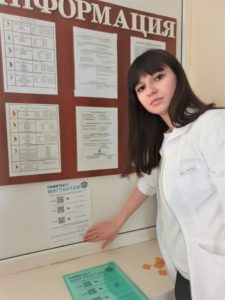 How and where do you share information about the services available?
How and where do you share information about the services available?
Migrants can access our informational leaflets in the places, which they visit, such as the migration departments, health institutions, which issue the required health certificates to them, pre-deportation detention centres, and higher educational institutions we cooperate with. We use QR codes, allowing migrants to download any information on their smartphones and use it when necessary. As a result, it brings clients to our consultants, who can provide them with any additional information needed.
Name one of your most important recent activities?
Recently, we appealed to the Public Monitoring Commission and asked it to help us access the migrants in pre-deportation detention centres. The Public Monitoring Commission sent an official request to the Ministry of Internal Affairs. We visited the detention centres, met with the migrants living with HIV who stayed there and agreed with the administration of such centres that we would have further access to such migrants living with HIV. We are planning to seek financial opportunities for people living with HIV to receive consultations from infectious disease doctors, get tested for their immune status and viral load and access ARVs for the period of their stay in such institutions. Besides, we are working on developing an appeal to the government officials about the need to provide this category of people with HIV treatment at the expense of the state.
[1]Migrant populations and HIV/AIDS: the development and implementation of programmes: theory, methodology and practice / UNAIDS, UNESCO.

